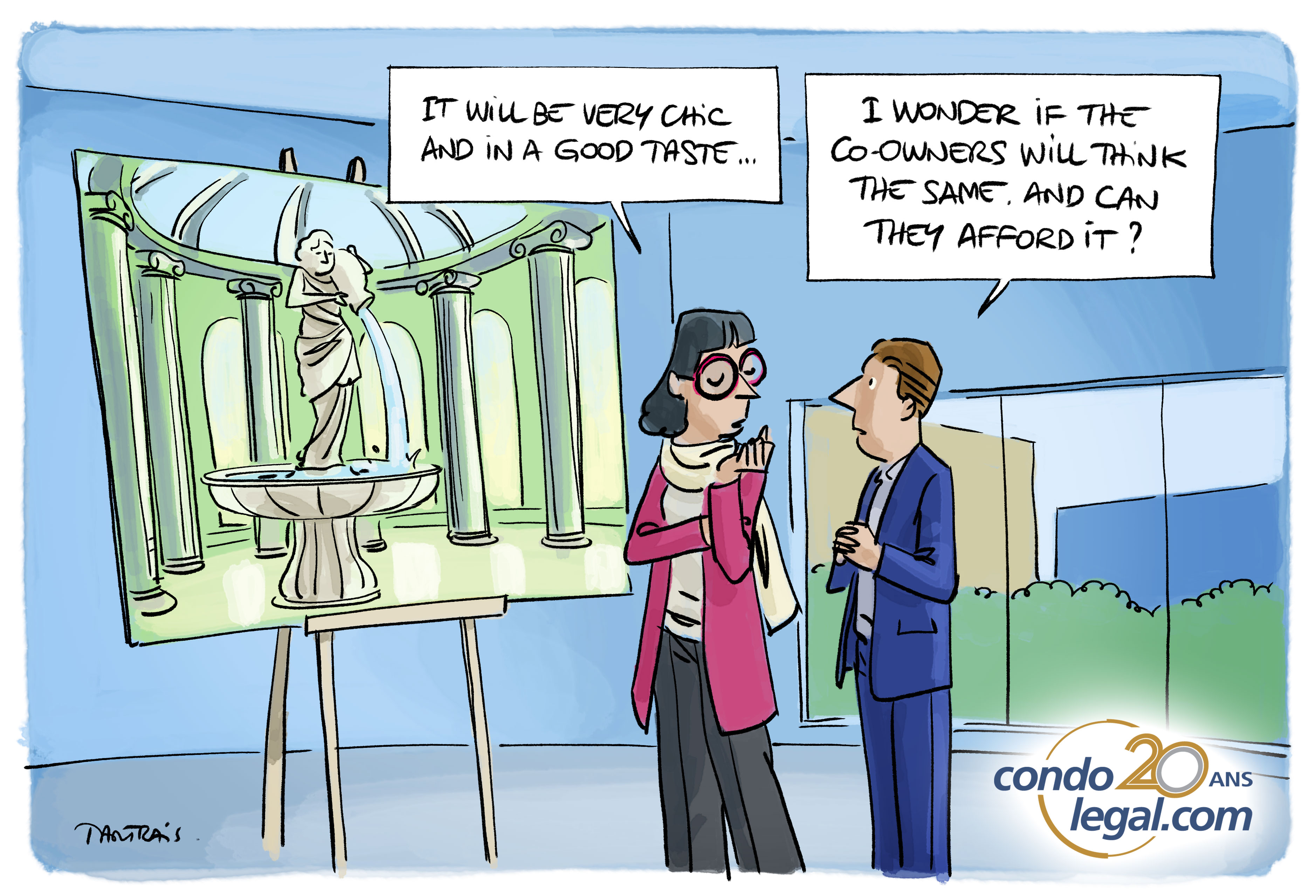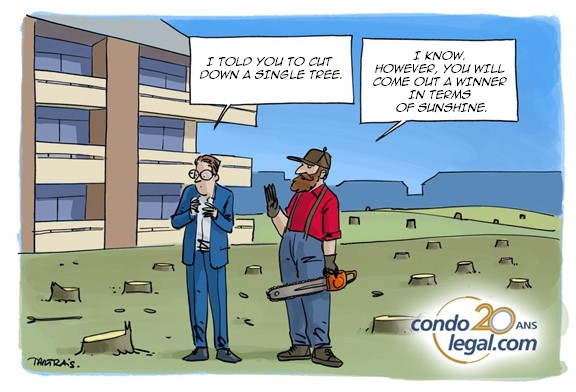 Works for the alteration, enlargement or improvement of the common portions are subject to a special regime. On the one hand, such work must be the subject of a formal authorization from the meeting of co-owners, by the enhanced majority of article 1097 of the Civil Code of Quebec. On the other hand, this kind of work must be compatible with the destination of the immovable and not infringe the rights of the co-owners over their private portions. This strict framework is directly derived from the legal conception of divided co-ownership, namely: the building must, in principle, be maintained as it is.
Works for the alteration, enlargement or improvement of the common portions are subject to a special regime. On the one hand, such work must be the subject of a formal authorization from the meeting of co-owners, by the enhanced majority of article 1097 of the Civil Code of Quebec. On the other hand, this kind of work must be compatible with the destination of the immovable and not infringe the rights of the co-owners over their private portions. This strict framework is directly derived from the legal conception of divided co-ownership, namely: the building must, in principle, be maintained as it is.
This is why, for work that goes beyond the simple maintenance or retrofitting to standards of the common portions of the building, it will require the approval of the meeting of co-owners.
Alteration work
The alteration work of the common portions concerns everything related to the physical form of these beyond their maintenance. For example, if the building has a swimming pool and there is a question about creating a second pool, there will be an alteration work of the common portions, subject to the authorization of the meeting of co-owners. The same would apply if the syndicate wanted to undertake work on the roof of the building, involving, for example, an enhancement of the building to possibly develop new common portions on the top floor of the building.
Work for the enlargement
As the expression suggests, the enlargement of the common portions necessarily involves work that increases the dimensions (or the area, or the volume, etc.) of a common portion. For example, if one of the stairwells in the building must be enlarged to meet safety standards and such an expansion requires the reduction of the dimensions of the adjacent private portions, this work will require the authorization of the meeting of co-owners and also from the owners of the units whose size is reduced (article 1102 of the Civil Code of Quebec). It would also be necessary to obtain the approval of the meeting of co-owners for works by which a co-owner would like to enlarge his terrace (as constituted as a common portion for restricted use). In order to do so, it was necessary to encroach on a common portion that is not constituted as a common portion for restricted use.
Work for improvement
Work for improvement is which exceeds the maintenance or upgrading of the common portions compared to pre-existing developments and therefore provides a certain valuation of the building. This is the case when the purpose of the work is to install new equipment to replace the old one, which is still in working order. The same shall apply in the case of the replacement of obsolete or defective elements by equipment which is more expensive than which would have been technically sufficient to provide equivalent services. In short, the notion of improvement is similar to that of transformation, but it differs from it in that it assumes added value.
Distinction between alteration and improvement work and maintenance work
It is not always possible to separate maintenance work from alteration or improvement work on common portions. There may be different degrees of repairs and maintenance. Certainly, "repairs" and " maintenance" can contain some degree of "improvement" and even "alteration", up to a certain point. In order to determine this situation, it is necessary to consider whether the alteration or improvement work takes precedence over the outright restoration work or whether the alterations represent only a fairly small part of the repairs and cannot be avoided.
In addition, over time, both materials and construction techniques evolve. Some materials disappear altogether, and are replaced by better-quality materials. Similarly, some construction techniques are neglected, the use having shown that they were not the best. In this context, does the fact of replacing a common part with new materials or using an improved technique amount to a transformation or improvement of that common part? Maintenance work on the common elements cannot be classified as work to transform or improve the common areas if the quality of the materials used is as reasonably close as possible to the original materials, taking into account the construction standards in force.
Upgrading to standard work
For the work that is necessary to bring the common portions of the building into compliance with the applicable laws and regulations, the question arises as to what authorizations are required for the realization of these. Following a judgment rendered by the Superior Court of Québec, the court concluded that upgrading to standard work is aimed at the preservation of the immovable and not its transformation. The upgrading to standards is precautionary even if the work involves incidentally a transformation to the building. It is the mandatory nature of the work that dictates its conservatory nature, since the upgrading is equated with the legal conservation of the building. It is therefore the board of directors of the syndicate of co-owners who can thus authorize the work of bringing it up to standard.
In case of doubt: consult a professional
In practice, it is not uncommon for work relating to major repairs or replacement of common portions to include some improvement, transformation or even expansion of common areas. The board of directors must then question its ability to authorize such work on its own. The task of the council is even more delicate when the work has the object or effect of changing the destination of the building. Therefore, it would be wise for the latter to request an opinion from a professional to determine the nature of the work and to have the heart clear.
 WHAT YOU SHOULD KNOW! The board of directors may itself undertake alteration work in the co-ownership, if it turns out that it is necessary for its upgrade. Work to correct the design defect must escape the application of article 1097 of the Civil Code of Quebec, even if it involves alteration or improvement in an incidental manner.
WHAT YOU SHOULD KNOW! The board of directors may itself undertake alteration work in the co-ownership, if it turns out that it is necessary for its upgrade. Work to correct the design defect must escape the application of article 1097 of the Civil Code of Quebec, even if it involves alteration or improvement in an incidental manner.
 WHAT TO KEEP IN MIND: The difference between maintenance work and alteration, enlargement and improvement work are the need for the latter. Maintenance work is necessary, while those that bring an alteration, enlargement or improvement to the common portions are not.
WHAT TO KEEP IN MIND: The difference between maintenance work and alteration, enlargement and improvement work are the need for the latter. Maintenance work is necessary, while those that bring an alteration, enlargement or improvement to the common portions are not.
 WARNING! Undertaking work to comply with a notice from the City is not alteration work. The Syndicate has no choice, nor the meeting of co-owners. In a judgment rendered by the Superior Court of Quebec, the Tribunal concluded that if the security of the immovable is at stake, the provisions of article 1097 of the Civil Code of Quebec do not apply. The syndicate therefore has no choice but to have this work carried out, which will be decided by the board of directors.
WARNING! Undertaking work to comply with a notice from the City is not alteration work. The Syndicate has no choice, nor the meeting of co-owners. In a judgment rendered by the Superior Court of Quebec, the Tribunal concluded that if the security of the immovable is at stake, the provisions of article 1097 of the Civil Code of Quebec do not apply. The syndicate therefore has no choice but to have this work carried out, which will be decided by the board of directors.




